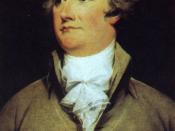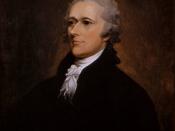Alexander Hamilton (1755 - 1804) plunged into revolutionary action
soon after this arrival in New York from the West Indies in 1773. He
served in the Continental Army and then in the Continental Congress.
He, being an advocate of a strong and centralized government, wrote
many of the Federalist essays that promoted the new constitution.
Hamilton participated in the Constitutional Convention. When George
Washington became president, he appointed his intelligent and
energetic ex-aide-de-camp (Hamilton) the position of the Secretary of
the Treasury of the United States. Hamilton embraced the challenge of
helping his country out of debt and as soon as he got into office, he
set out immediately to correct these economic vexations. He pieced
together a financial plan from European and English precedents on such
revenue methods as tariffs and excise taxes. On January 14, 1970, he
submitted to Congress the details of his financial plan, the "Report
on the Public Credit."
In his "Report on the Public Credit," Hamilton stated that public
confidence in the government was crucial. To do this he urged Congress
to "fund" the entire nation debt "at par" and to assume completely the
debts incurred by the states during the recent war. This mean that the
government would pay off an initial payment and the rest would be paid
off through time with interest. The national debt at the time was an
enormous $54 million. He proposed and supported the exchange of old
war bonds for new Federal Reserve bonds. He hoped that this would
establish a sense that the United States was responsible in paying off
its debts. As a result, other nations would allow the United States to
borrow more money to establish a good credit. Also, Hamilton made a
convincing case in persuading Congress to assume the debts of...


